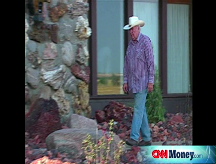Oil: What the drilling advocates say
Supporters say there could be much more oil offshore than the government predicts as they fight for access to new supplies to lower the price of oil.

NEW YORK (CNNMoney.com) -- Support for more U.S. oil drilling is on the rise, despite the opinions of many analysts who say the potential supply is too small to significantly lower the price.
Government estimates assume that drilling off the eastern and western coasts offers just over 1 million barrels a day. Even John McCain - who has made offshore drilling a cornerstone of his energy platform - doesn't dispute that figure, which is dwarfed by worldwide production. Currently world production stands at about 73 million barrels of oil each day.
Drilling in Alaska's Arctic National Wildlife Refuge could kick in another million barrels, though many drilling advocates - including McCain - don't support lifting the ban there.
Republicans were first to make the case for drilling, saying that more domestic supply would significantly bring down global prices despite government experts who say it would only shave 2 or 3 cents off the price of a gallon of gas.
Now Democrats, including Barack Obama and House Speaker Nancy Pelosi, are grudgingly getting on board - as a part of a compromise to push through a comprehensive energy policy in Congress.
Polls show that Americans are overwhelmingly in favor of expanded drilling too.
The current debate over drilling is holding up other energy fixes in Congress. They include tax breaks that are essential for further investments in renewable energy and other measures to help Americans use less oil.
Given the seeming futility of expanded drilling to lower prices, how do drilling's boosters support their argument?
For starters, they think there could be more oil than the government says.
"We think the estimates are extremely conservative," said Brian Kennedy, a spokesman for the Institute for Energy Research, a Washington, D.C.-based think tank that supports more drilling.
Kennedy said the government thought Alaska's Prudhoe Bay field originally held 6 billion barrels of oil. Since the field began producing in 1977, Kennedy said it has provided about 14 billion barrels of oil.
Other reports have shown the discrepancy between estimated production and actual production in Prudhoe Bay to be smaller, but still it ended up producing more oil than initial projections.
"They have a bit of a weatherman's track record when it comes to forecasting," Kennedy said.
Kennedy also said more drilling would increase the world's spare production capacity - the difference between what the world currently produces and what it could produce if all the spigots were turned on.
Spare production capacity is currently about 1.5 million barrels a day, most of which is held by Saudi Arabia. But just a few years ago, spare production capacity was 4 or 5 million barrels a day. That tight margin today is one reason why oil prices are so high - there is less surplus crude available to cover a disruption in supplies.
But while Kennedy believes additional drilling may double spare production capacity, the U.S. Energy Information Administration (EIA) says the Saudis would simply invest less in new fields if the United States increased its own investment, leaving spare production capacity little changed.
Kennedy said another reason to drill is that a million barrels of oil a day - or whatever the final number is - means a million barrels we don't have to buy from a foreign country.
That, he said, would help our trade deficit and create jobs at home.
"It would protect the U.S. from supply shocks elsewhere, and it's probably the best stimulus we could come up with," said Kennedy.
Taylor Griffin, a spokesman for the McCain campaign, said that any extra oil is needed in a tight market. "You're talking about a million barrels a day coming online, the additional supply is a big deal."
'It's part of a comprehensive solution, you can't do just one thing," Griffin said, noting that McCain is calling for more drilling offshore but not in Alaska's wildlife refuge, and is championing other energy initiatives, including a suspension of the federal gas tax and a big push in nuclear power.
That sentiment is echoed by the oil industry, which has consistently told Congress that among the many things lawmakers could do to lower gas prices is to open up more areas of the country for drilling.
"Let's do everything," said Rayola Dougher, senior economic advisor for the American Petroleum Institute, noting that the discussion doesn't have to be either drilling or renewables, but can be both. "No one knows what impact it's going to have 10 years down the road, but we're still going to need more oil and gas."
If everyone agrees that we should do everything, why is it that we're spending so much time talking about drilling, and less time on other measures like conservation and alternatives?
Griffen said because drilling is one area in energy policy where Obama and McCain disagree.
"We're not talking about alternatives because we both support alternatives," he said.
People against more drilling cite the estimates from the government - the EIA says opening Alaska's wildlife refuge would cause gasoline prices to fall by 2 or 3 cents a gallon by 2020 - and say Republicans are keeping the issue alive simply to use against the Democrats in the November election.
"The Republicans think they've identified an issue they can win on," said Karen Wayland, legislative director for the Natural Resources Defense Council. "This is just about making it a wedge issue."
Wayland, channeling similar sentiments from many Democrats and citing numbers showing the oil industry already has access to nearly 80% of the oil reserves in North America, called the whole debate about expanding offshore drilling "a distraction from the real solutions." ![]()





